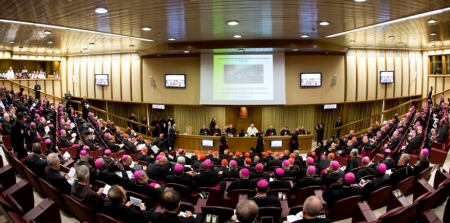Not All Catholic Bishops Onboard With Positive Language Toward Same-Sex Couples in Controversial Synod Report; Needs 'Right Degree of Prudence'

A recently released midterm report from the Synod of Bishops on the family, which defended the traditional definition of marriage but used positive language toward same-sex couples in some situations, has garnered controversy among some bishops who say it does not accurately reflect the assembly's views.
"In regard to homosexuality, there was noted the need for welcoming, with the right degree of prudence, so as not to create the impression of a positive valuation of that orientation," read a summary of the remarks some bishops had toward the report, Catholic News Service reported. "It was hoped that the same care would be taken in regard to cohabitation."
The mid-term report earlier this week ruled out changes to the definition of marriage as between one man and one woman, but said that the Synod bishops are working with the concept that gay people have "gifts and qualities" to offer the church.
"Without denying the moral problems connected to homosexual unions, it has to be noted that there are cases in which mutual aid to the point of sacrifice constitutes a precious support in the life of the partners," the Synod summary reportedly said.
The two-week long meetings in October are only expected to provide a framework for dealing with the issues before the Roman Catholic Church, but any formal changes to church guidelines will be voted on in a second Synod meeting in 2015.
The Bishops who expressed dissatisfaction with the language in the midterm report noted that it makes few references to the concept of sin, and encouraged the assembly to emulate the "prophetic tone of Jesus, to avoid the risk of conforming to the mentality of today's world."
U.S. Cardinal Raymond L. Burke, prefect of the Supreme Court of the Apostolic Signature, told Catholic World Report that the midterm report "advances positions which many synod fathers do not accept and, I would say, as faithful shepherds of the flock cannot accept. Clearly, the response to the document in the discussion which immediately followed its presentation manifested that a great number of synod fathers found it objectionable."
The report was much discussed in Catholic circles, with Father Robert Barron, founder of Word On Fire Catholic Ministries, noting that it will be a long time before any concrete assessments can be made.
"Two more weeks of discussion will follow; then a full year during which the findings of the Synod will be further refined, argued about, and clarified; then the Ordinary Synod on the Family will take place (the one going on now is the Extraordinary Synod), and many more arguments and counter-arguments will be made; finally, some months, perhaps even a year or so, after that, the Pope will write a post-Synodal exhortation summing up the entire process and offering a definitive take on the matter," Barron wrote.
"At that point, I would suggest, something resembling edible sausage will be available for our consumption; until then, we should all be patient and refrain from bloviating."
Cardinal Wilfrid F. Napier of Durban, South Africa argued, however, that the midterm report adds more confusion to issues than it clarifies. He said that in the report there are "quite a lot of things which are expressed in a way which we certainly wouldn't feel that are very helpful to giving a clear idea of where the church stands on some of the issues that are being raised."
"Individual things that were said by individuals, may have been repeated a couple of times, are put in here as if they really do reflect the feeling of the whole synod. They've been picked up by the media then and made to be the message of the synod. I think that's where the upset is," Napier added.
Other topics the Synod bishops are discussing include cohabiting couples, which the Catholic Church does not approve of. Napier noted that the report accurately reflected views to drop "very harsh language that alienates people," but it has not been suggested that the teachings of the Church will themselves change.
Evangelicals such as Russell Moore, president of the Southern Baptist Convention's Ethics & Religious Liberty Commission, have also shared their views on the Synod.
In a recent column, Moore write that "[we] don't yet know exactly what the report means, but reports indicate that the synod is asking for a more 'pastoral' and 'more inclusive' approach to cohabiting couples, same-sex partners, and others, while retaining the traditional Catholic views on sexuality and the family. Should all of this even matter to those of us who are Protestants? We do not, as Martin Luther put it, accept the authority of popes and councils 'since these have often contradicted one another. ' And yet, there are some important questions posed here, that we should consider."






















